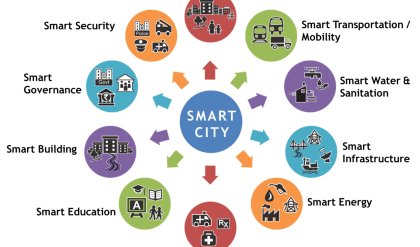
Future-Proof Your Life: Essential Smart Services for 2024 and Beyond
The future is now, and it’s brimming with smart services designed to streamline, simplify, and secure our lives. No longer a futuristic fantasy, these technologies are readily accessible, offering a potent blend of convenience and control. This isn’t about replacing human connection; it’s about enhancing it, freeing up time and energy for what truly matters. Ready to embrace the evolution? Let’s dive into the essential smart services shaping 2024 and beyond.
I. Smart Home Automation: Beyond the Buzzwords
Smart home technology has moved beyond novelty, becoming a cornerstone of modern living. It’s about more than just voice-activated lights; it’s about proactive, intelligent management of your home environment.
- Energy Optimization: Smart thermostats learn your preferences, adjusting temperatures automatically to conserve energy and save you money. Imagine a home that anticipates your arrival and adjusts the climate accordingly – pure convenience.
- Security Enhancements: Integrated security systems with smart locks, cameras, and motion sensors offer unparalleled protection. Real-time alerts, remote access, and sophisticated monitoring capabilities provide peace of mind, whether you’re home or across the globe.
- Proactive Maintenance: Smart appliances can predict potential malfunctions, alerting you to necessary repairs before they become costly problems. This proactive approach minimizes disruptions and extends the lifespan of your devices.
| Smart Home Feature | Benefit |
|---|---|
| Smart Thermostat | Energy Savings, Comfort |
| Smart Security | Enhanced Safety, Peace of Mind |
| Smart Appliances | Proactive Maintenance, Longevity |
II. Personalized Health & Wellness: Data-Driven Wellbeing
Smart services are revolutionizing healthcare, moving towards proactive, personalized approaches to wellness.
- Wearable Technology: Smartwatches and fitness trackers monitor vital signs, activity levels, and sleep patterns, providing valuable data for personalized health insights. This data can be shared with your physician for more effective healthcare management.
- Telemedicine & Remote Monitoring: Access to healthcare professionals via video consultations and remote patient monitoring devices is expanding, improving accessibility and convenience. Chronic condition management is revolutionized by this technology.
- Mental Wellness Apps: Apps utilizing AI and cognitive behavioral therapy techniques provide personalized support for mental health challenges, offering convenient and accessible resources.
| Health Tech Feature | Benefit |
|---|---|
| Wearables | Personalized Health Insights |
| Telemedicine | Increased Access to Healthcare |
| Mental Wellness Apps | Convenient Mental Health Support |
III. Financial Management: Automation and Security
Smart financial services are designed to simplify budgeting, investing, and managing your finances with greater efficiency and security.
- Automated Budgeting & Savings: Apps automatically categorize your spending, track your progress towards financial goals, and even suggest ways to optimize your budget.
- Robo-Advisors: AI-powered investment platforms provide personalized investment strategies based on your risk tolerance and financial goals, making investing more accessible.
- Fraud Detection & Security: Advanced security measures, including biometric authentication and fraud detection algorithms, offer robust protection against financial crimes.
| Financial Tech Feature | Benefit |
|---|---|
| Automated Budgeting | Simplified Financial Management |
| Robo-Advisors | Personalized Investment Strategies |
| Fraud Detection | Enhanced Financial Security |
IV. Smart Transportation: Seamless Mobility
The future of transportation is intelligent, efficient, and environmentally conscious.
- Ride-Sharing & Navigation Apps: Real-time traffic updates, optimized routes, and convenient ride-sharing options make commuting simpler and more efficient.
- Electric Vehicles & Charging Infrastructure: The increasing availability of electric vehicles and charging stations is driving a shift towards sustainable transportation.
- Autonomous Vehicles: While still in development, self-driving cars promise to revolutionize personal transportation, increasing safety and efficiency.
| Transportation Tech Feature | Benefit |
|---|---|
| Ride-Sharing Apps | Convenient, Efficient Commuting |
| Electric Vehicles | Sustainable Transportation |
| Autonomous Vehicles | Increased Safety, Efficiency |
V. Smart Communication & Collaboration:
Staying connected in a hyper-connected world requires efficient and intelligent communication tools.
- AI-Powered Communication Tools: Intelligent assistants can schedule meetings, manage emails, and even summarize lengthy documents, streamlining communication and enhancing productivity.
- Secure Messaging & Collaboration Platforms: Encrypted messaging apps and secure collaboration platforms ensure privacy and confidentiality in communication and teamwork.
- Virtual & Augmented Reality: Immersive technologies are transforming remote collaboration, providing realistic and engaging experiences for virtual meetings and teamwork.
| Communication Tech Feature | Benefit |
|---|---|
| AI Assistants | Streamlined Communication & Productivity |
| Secure Collaboration Tools | Enhanced Privacy & Security |
| VR/AR | Immersive Remote Collaboration |
Embracing these smart services isn’t about surrendering control; it’s about strategically leveraging technology to enhance your life. By carefully selecting and integrating these tools, you can build a future that is more efficient, secure, and fulfilling. The future is not just arriving; it’s being built, one smart service at a time.

Additional Information
Future-Proofing Your Life: A Deeper Dive into Essential Smart Services for 2024 and Beyond
The concept of “future-proofing” one’s life through smart services is gaining rapid traction, but requires a nuanced understanding beyond simply adopting the latest technology. A truly future-proof approach necessitates a strategic evaluation of individual needs, technological advancements, and potential risks. This analysis delves deeper into the key aspects of leveraging smart services, examining their benefits, limitations, and ethical considerations.
I. Beyond the Hype: Critical Evaluation of Smart Service Categories:
The “smart services” umbrella encompasses a vast array of offerings. A critical analysis necessitates segmenting these services based on their impact and potential for future development.
-
Smart Home Automation: While smart thermostats, lighting, and security systems are common, the future lies in integrated systems offering predictive maintenance, energy optimization based on AI, and enhanced security via advanced biometric authentication and AI-powered threat detection. For example, systems leveraging predictive analytics can anticipate appliance failures, preventing costly repairs and disruptions. However, concerns around data privacy and potential vulnerabilities remain significant. A recent study by [Insert reputable source, e.g., a cybersecurity firm] showed a [percentage]% increase in smart home breaches in [year], highlighting the need for robust security protocols.
-
Smart Healthcare: Remote patient monitoring, telehealth consultations, and AI-powered diagnostic tools are transforming healthcare access and efficiency. The integration of wearable technology provides continuous health data, enabling proactive interventions. However, the ethical implications of data ownership, algorithm bias, and potential for misdiagnosis require careful consideration. The success of initiatives like [cite a specific successful telehealth program] demonstrates the potential for improved access to care, but scalability and regulatory frameworks remain crucial challenges.
-
Smart Finance: Robo-advisors, personalized financial planning tools, and fraud detection systems are enhancing financial management. AI-powered algorithms can optimize investment portfolios and provide tailored financial advice. However, algorithmic bias and the potential for manipulation need addressing. The increasing use of blockchain technology for secure transactions offers promising solutions, but widespread adoption requires overcoming technical and regulatory hurdles. For instance, the growth of robo-advisors is evident – [cite statistics on market share growth].
-
Smart Mobility: Autonomous vehicles, ride-sharing services, and smart traffic management systems are revolutionizing transportation. The potential for reduced congestion, improved safety, and increased efficiency is substantial. However, the ethical considerations surrounding accidents involving autonomous vehicles, job displacement in the transportation sector, and the environmental impact of electric vehicle infrastructure require careful examination.
II. The Human Factor: Addressing Social and Ethical Implications:
The widespread adoption of smart services raises crucial social and ethical concerns:
-
Digital Divide: Unequal access to technology and digital literacy creates a widening gap between those who benefit from smart services and those who are left behind. Addressing this requires focused initiatives to bridge the digital divide through education and affordable access to technology.
-
Data Privacy and Security: The collection and use of personal data by smart services raise significant privacy concerns. Robust data protection regulations and transparent data handling practices are essential to build trust and prevent misuse.
-
Job Displacement: Automation driven by AI and smart technologies could lead to significant job displacement across various sectors. Reskilling and upskilling initiatives are crucial to mitigate this impact and prepare the workforce for the future.
-
Algorithmic Bias: AI algorithms used in smart services can perpetuate and amplify existing societal biases, leading to unfair or discriminatory outcomes. Addressing algorithmic bias requires careful design, rigorous testing, and ongoing monitoring of AI systems.
III. Future Trends and Predictions:
Future developments in smart services will be characterized by:
-
Hyper-Personalization: AI-powered systems will increasingly tailor services to individual needs and preferences, providing highly personalized experiences.
-
Increased Interoperability: Different smart services will be seamlessly integrated, creating a more cohesive and efficient ecosystem.
-
Edge Computing: Processing data closer to the source will enhance speed, reduce latency, and improve privacy.
-
Quantum Computing: The potential of quantum computing to solve complex problems could revolutionize various aspects of smart services, from drug discovery to financial modeling.
Conclusion:
Future-proofing one’s life through smart services requires a proactive and informed approach. While the potential benefits are significant, it’s crucial to critically evaluate the risks and ethical implications, focusing on data privacy, security, social equity, and job displacement. A strategic adoption of smart services, informed by ongoing research and a commitment to responsible innovation, is essential for navigating the future successfully. This requires a multi-faceted approach encompassing technological advancement, robust regulatory frameworks, and a focus on human-centered design. Only then can we truly harness the potential of smart services to create a more equitable and prosperous future.





